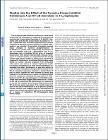| dc.contributor.author | O'NEILL, LUKE ANTHONY JOHN | |
| dc.date.accessioned | 2009-10-05T15:03:31Z | |
| dc.date.available | 2009-10-05T15:03:31Z | |
| dc.date.issued | 1995 | |
| dc.date.submitted | 1995 | en |
| dc.identifier.citation | Mahon TM, O'Neill LA. `Studies into the effect of the tyrosine kinase inhibitor herbimycin A on NF-kappa B activation in T lymphocytes. Evidence for covalent modification of the p50 subunit? in Journal of Biological Chemistry, 270, (48), 1995, pp 28557 - 28564 | en |
| dc.identifier.other | Y | |
| dc.identifier.other | Y | en |
| dc.identifier.uri | http://hdl.handle.net/2262/33733 | |
| dc.description | PUBLISHED | en |
| dc.description.abstract | The tyrosine kinase inhibitor herbimycin A was found to block NF-kappa B stimulation in response to interleukin-1 and phorbol 12-myristate 13-acetate in EL4.NOB-1 thymoma cells and phorbol 12-myristate 13-acetate in Jurkat T lymphoma cells. The effect appeared not to involve inhibition of tyrosine kinase activation as neither interleukin-1 nor phorbol 12-myristate 13-acetate induced major changes in tyrosine phosphorylation in EL4.NOB-1 or Jurkat cells, respectively. Herbimycin A did not interfere with I kappa B-alpha degradation, and in unstimulated cells, it modified NF-kappa B prior to chemical dissociation with sodium deoxycholate. Because herbimycin A is thiol-reactive, we suspected that the target was the p50 subunit of NF-kappa B, which has a key thiol at cysteine 62. Herbimycin A inhibited DNA binding when added to nuclear extracts prepared from stimulated cells, which were shown to contain high levels of p50. Incubation of herbimycin A with 2-mercaptoethanol attenuated the effect. Herbimycin A was also shown to react directly with p50, blocking its ability to bind to the NF-kappa B consensus sequence. However, a mutant form of p50 in which cysteine 62 was mutated to serine was insensitive to herbimycin A. Finally, we demonstrated that the compound inhibited the expression of interleukin-2 (an NF-kappa B-regulated gene) in EL4.NOB-1 cells. These data therefore suggest that herbimycin A inhibits NF-kappa B by modifying the p50 subunit on cysteine 62 in the NF-kappa B complex, which blocks DNA binding and NF-kappa B-driven gene expression. The results urge caution in the use of herbimycin A as a specific tyrosine kinase inhibitor and suggest that the development of agents that selectively modify p50 may have potential as a means of inhibiting NF-kappa B-dependent gene transcription. | en |
| dc.description.sponsorship | This work was supported by grants from Forbairt, the Cancer Research Advancement Board, and BioResearch Ireland. | en |
| dc.format.extent | 28557 | en |
| dc.format.extent | 28564 | en |
| dc.format.extent | 376340 bytes | |
| dc.format.mimetype | application/pdf | |
| dc.language.iso | en | en |
| dc.publisher | The American Society for Biochemistry and Molecular Biology | en |
| dc.relation.ispartofseries | Journal of Biological Chemistry | en |
| dc.relation.ispartofseries | 270 | en |
| dc.relation.ispartofseries | 48 | en |
| dc.rights | Y | en |
| dc.subject | Biochemistry | en |
| dc.title | Studies into the effect of the tyrosine kinase inhibitor herbimycin A on NF-kappa B activation in T lymphocytes. Evidence for covalent modification of the p50 subunit. | en |
| dc.type | Journal Article | en |
| dc.type.supercollection | scholarly_publications | en |
| dc.type.supercollection | refereed_publications | en |
| dc.identifier.peoplefinderurl | http://people.tcd.ie/laoneill | |
| dc.identifier.rssinternalid | 5040 | |
| dc.identifier.rssuri | http://dx.doi.org/10.1074/jbc.270.48.28557 | |




